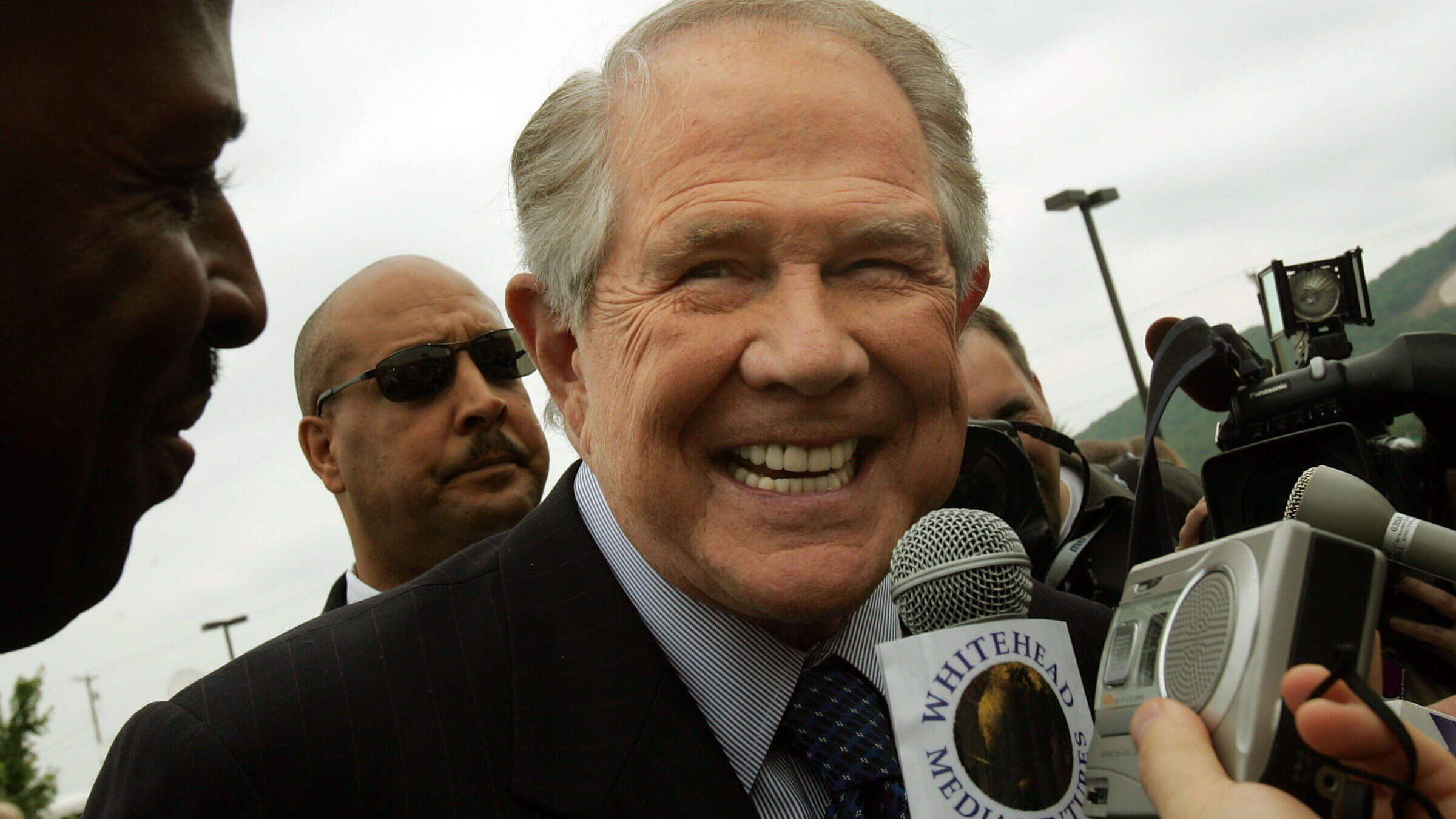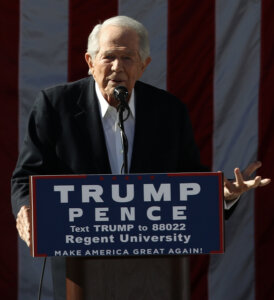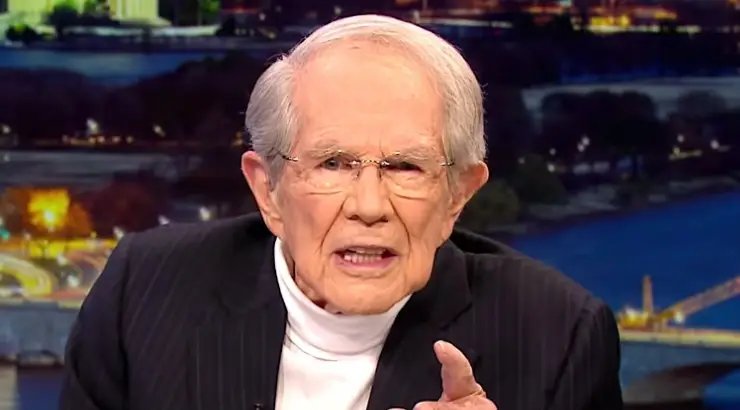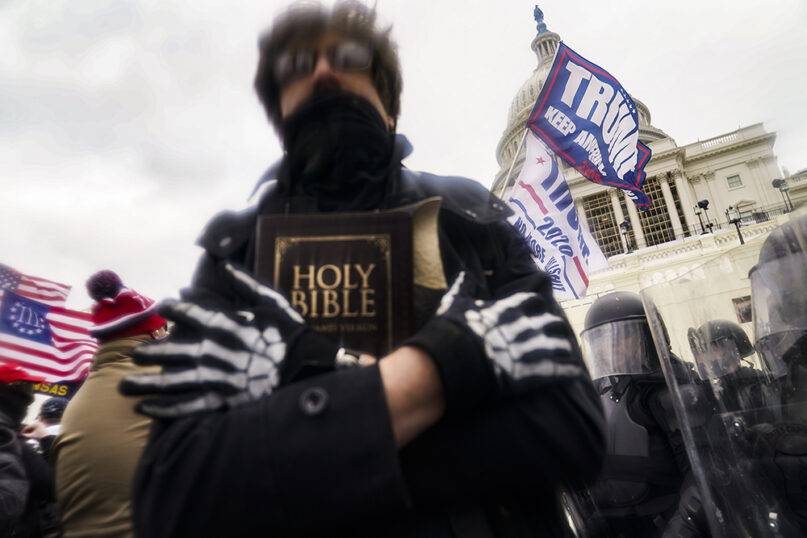Dabbling in antisemitism, Pat Robertson portrayed himself as a friend to certain kinds of Jews

Pat Robertson at Jerry Falwell’s funeral, 2007 Photo by Getty Images
Pat Robertson, the televangelist who died June 8 at age 93, could at times appear to cherish Jewish traditions. His 700 Club program, a chat show expounding right-wing Christian ideology, regularly organized Rosh Hashanah celebrations because, as Robertson claimed during one broadcast, “We identify with our dear friends in the Jewish community and Israel.”
Yet he was also capable of comments like this, made during a 2014 program in which Robertson hosted the Orthodox rabbi Daniel Lapin and claimed: “What is it about Jewish people that make them prosper financially? You almost never find Jews tinkering with their cars on the weekends or mowing their lawns.”
To which Rabbi Lapin concurred that he paid others to tend his car and lawn. Robertson added that the rabbi was busy “polishing diamonds, not fixing cars.”
When this exchange was reported in the media, Robertson’s Christian Broadcasting Network (CBN) issued a press release attempting to defuse the exchange as a mere “jovial back-and-forth” featuring “good-natured ribbing” by Robertson, rather than a “slur on the Jewish people.”
Yet Robertson’s long and lucrative career was littered with comparable misunderstandings, in part because his attraction to Jews and Israel was complicated by a need to convert Jews to Christianity, through associations with groups like Jews for Jesus.
This imperative was evident even in his less blatant comments about Jews. Robertson began a televised presentation around 2004, “Why Evangelical Christians Support Israel” by citing an anecdote in which Queen Victoria supposedly asked her Jewish prime minister, Benjamin Disraeli, for evidence of the existence of God. Disraeli’s reply: “The Jew, your majesty.”
Although doubtless intended as a tribute to the resilience of Jewish survival, the specious tale, as theologians Aron Engberg and Stephen Haynes have explained, has been used about a variety of European leaders in antisemitic, as well as philosemitic, contexts.
As Engberg suggests, the fictional story casts Jews as a species apart from the rest of humanity, seen with hatred and love, what the Polish Jewish literary critic Artur Sandauer termed allosemitism.
Sandauer’s compatriot, the sociologist Zygmunt Bauman, found the word allosemitism useful because it captured the ambivalence of multiple messaging. Pat Robertson specialized in this type of rhetoric.

Despite his loud support for Israel as a place to be reclaimed by Christians, in 2006 Robertson reacted to Israeli Prime Minister Ariel Sharon suffering a stroke by suggesting that the illness was divine punishment for “dividing God’s land.” Sharon was seen by Robertson as making unacceptable concessions by ordering Israel’s disengagement from Gaza the previous year.
On the same broadcast, Robertson also diagnosed the 1995 assassination of Prime Minister Yitzhak Rabin as God’s punishment for Rabin’s efforts to achieve peace by giving land to the Palestinians. Abraham Foxman, then-director of the Anti-Defamation League (ADL), called Robertson’s comments “un-Christian and a perversion of religion. Unlike Robertson, [Jews] don’t see God as cruel and vengeful.”
A 1994 ADL report on the religious right’s attempts to make America an entirely Christian nation so irked Robertson that he wrote to Foxman:
“It is painfully obvious that you are a deeply troubled individual who has somewhere along the way lost your Judaic roots. Please know, Abe, that I will pray earnestly that you may indeed meet personally the God of Abraham, Isaac and Jacob.”
To which Foxman retorted:
“It’s just like you to decide for others what their spiritual needs are or should be. I have met my God of Abraham, Isaac and Jacob and do not need your guidance, prayers or intervention.”
Indeed, it was like Robertson to tell Israelis what to do in their own country, or what Jews should do to be acceptable in his eyes. Robertson’s 1991 book The New World Order repeated antisemitic conspiracy theories about the Jewish financiers Paul Warburg, Jacob Schiff and the Rothschild family. He also underlined that “Communism was the brainchild of German-Jewish intellectuals.”
In 1995, responding to ongoing controversy, Robertson told The New York Times that it was all a misunderstanding. Claiming that a reporter from Haaretz had once told him, “You’re more Israeli than Menachem Begin,” Robertson noted that he opposed American Jews who “have embraced the New Deal and the Fair Deal and incorporated them into Judaism,” adding: “And to me, they’re not a part of Judaism.”
For Robertson’s brand of approved right-wing Jews, toeing the line offered potential rewards. During a run for the presidency in 1988, as he later recalled in The New World Order, he was surprised that his promise to accept only Christians and Jews in government service offended some people. He was certain that “those who believe in Christian values are better qualified to govern America than Hindus and Muslims.”
On a 700 Club broadcast, Robertson had specified: “Individual Christians are the only ones really — and Jewish people, those who trust the God of Abraham, Isaac and Jacob — are the only ones that are qualified to have the reign, because hopefully, they will be governed by God and submitted to him.”
Along these lines, in a 1986 interview with New York Magazine, Robertson likened non-Christians to “termites” who destroy “institutions that have been built by Christians,” before concluding with an apocalyptic warning: “The time has arrived for a godly fumigation.” Whether Jews who failed to fit his definition of Judaism were also candidates for fumigation went unmentioned.
Small wonder that during one of Robertson’s controversies, Russell Moore, dean of the School of Theology at the Southern Baptist Theological Seminary, commented that Robertson had long propounded a “prosperity gospel” that he likened to an Asherah pole, mentioned repeatedly in the Hebrew Bible as a cult object related to the worship of a rival deity to Yahweh.
According to one report, at a 1980 staff meeting of the CBN, Robertson asserted that Jews were “spiritually deaf” and “spiritually blind.” The English Jewish polemicist Christopher Hitchens noted that Robertson was given to referring to The Economist magazine as “the Rothschild publication.”
Classifying Robertson among his fellow televangelists as “Chaucerian frauds, people who are simply pickpockets who prey on the gullible,” Hitchens had undisguised contempt for their “antisemitic innuendo.”
Likewise, the journalist Bill Moyers, accepting an award from the American Jewish Committee in 1995, bemoaned that the “party of Abraham Lincoln has become the parish of Pat Robertson.”
Whatever his parish featured, Robertson was far from a regular churchgoer. In 1987 he admitted to an interviewer that although nominally a member of Virginia’s Freemason Street Baptist Church, he had not attended services in years, explaining: “It is boring. I didn’t enjoy going there.”
An Esquire Magazine report in 1994 visiting a private Christian university he founded in 1977, Christian Broadcasting Network University, later renamed Regent University, expressed surprise that no church had been included on the extensive campus. Only in 2013 did Robertson’s university add a chapel, as if in an afterthought.
So in evaluating Robertson’s troubled rapport with Jews and Jewish tradition, it may be useful to consider that perhaps his legacy really is primarily about political clout and money-making, with spirituality merely a “boring” detail.










